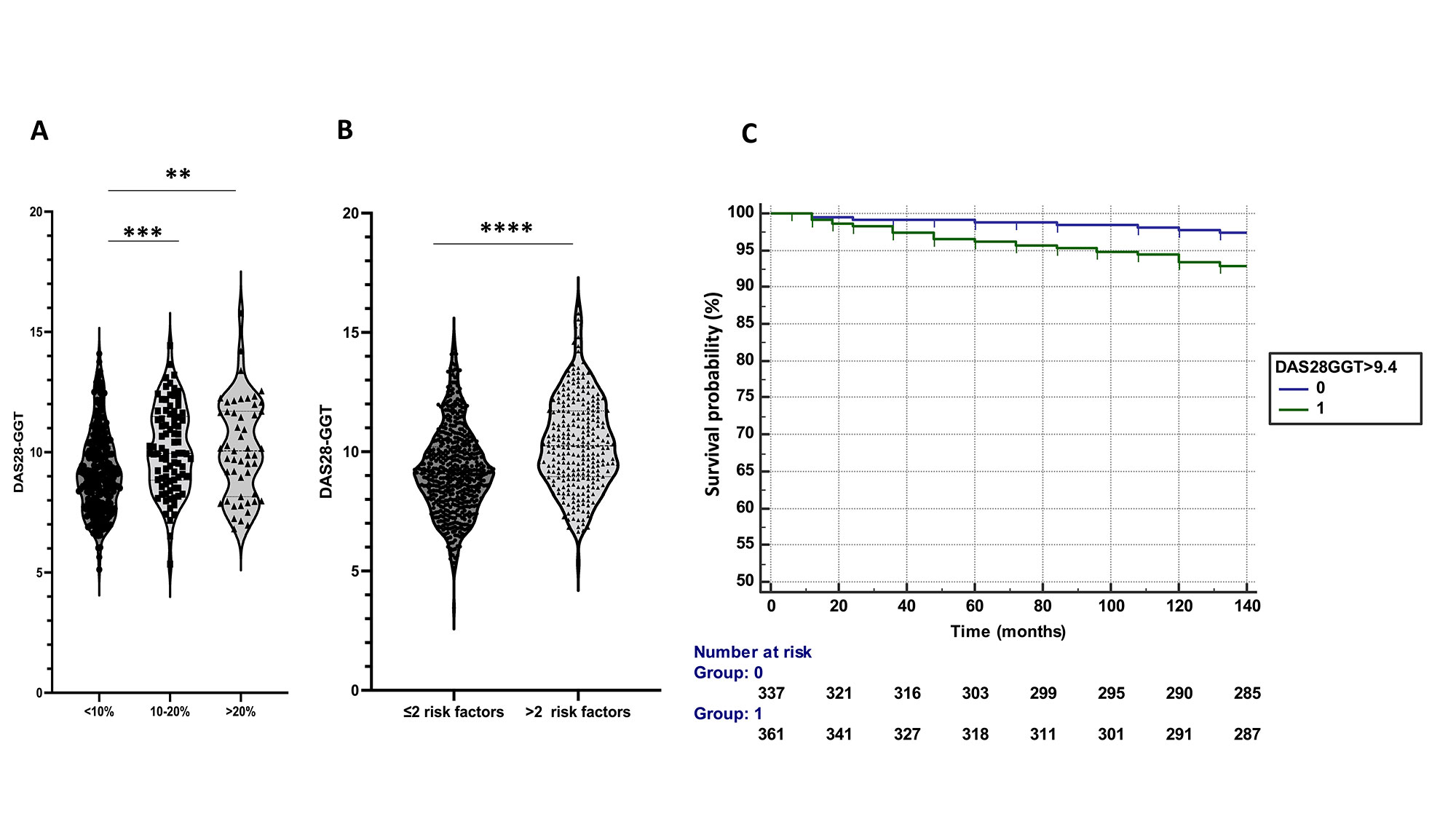Session Information
Session Type: Poster Session B
Session Time: 9:00AM-10:30AM
Background/Purpose: Patients with rheumatoid arthritis (RA) experience premature mortality that is largely due to cardiovascular disease (CVD). Ample evidence suggests that elevated γGT activity is associated with increased risk of CVD. We have previously showed that replacing ESR by γGT in DAS28 calculation (DAS28-γGT) allowed a combined evaluation of cardiovascular risk in patients with RA, in addition to joint disease activity (Vergneault et al, J Rheumatol 2020). Our objective was to validate the predictive value of the DAS28-γGT for the occurrence of major cardiovascular events (MACE) in the ESPOIR cohort.
Methods: We conducted a prospective observational study including patients with RA from the ESPOIR cohort fulfilling the 2010 ACR/EULAR criteria. Patients were recruited between 2002 and 2005 and were followed up to 10 years. Patients with a history of CVD and not followed up to 1 year were excluded from the analysis. DAS28-γGT was calculated at baseline using the following formula: 0.56*√TJ-28+0.28*√SJ-28+2*ln (γGT)+0.014*GH. Our primary outcome was the occurrence of MACE during the observation period.
Results: 720 RA patients (77% females) were considered with a mean age of 48±13 years and a mean disease duration of 93±185 days. Positive rheumatoid factor and anti-CCP antibodies were detected in 42% and 38% of patients, respectively, and 37% of patients presented bone erosions. The mean DAS28 was 5.1±1.3.
At baseline, the DAS28-γGT correlated with age (r=0.26, p< 0.001) and the Framingham risk score (r=0.31, p< 0.001). The DAS28-γGT was also significantly increased in males (10.3±1.8 vs. 9.4±1.9, p< 0.001) and in patients presenting the following conditions: high alcohol consumption (11.2±1.8 vs. 9.5±1.9, p< 0.001), active smoking (9.72±1.93 vs. 9.44±1.86, p=0.036), blood hypertension (10.2±2.01 vs. 9.44±1.85, p< 0.001), diabetes mellitus (10.67±2.20 vs. 9.53±1.87, p=0.001), hypercholesterolemia (9.95±1.97 vs. 9.50±1.88, p=0.017) and obesity (BMI > 30 kg/m2) (10.01±1.90 vs. 9.26±1.83, p< 0.001). No association was observed between DAS28-γGT and treatment with NSAIDs or corticosteroids. The DAS28-γGT steadily increased according to CV risk (Figure 1A) and was significantly increased in patients with at least 2 CV risk factors (Figure 1B).
A total of 35 MACE was recorded during the observation period, with a mean time to event of 70±44 months. ROC curve analysis indicated that DAS28-γGT >9.4 had the best sensitivity (74%) and specificity (62%) for the diagnosis of MACE during the observation period. Increased DAS28-γGT ( >9.4) was predictive of the occurrence of MACE, with a hazard ratio (HR) of 3.05 (95% confidence interval, CI 1.44-5.43) (Figure 1C). Multivariate Cox analyses confirmed increased DAS28-γGT together with age and diabetes mellitus as independent predictors of MACE (Table 1). Interestingly, the DAS28 and γGT activity were not predictive of the occurrence of MACE in this cohort.
Conclusion: The DAS28-γGT was identified in this large prospective cohort as an independent predictor of MACE in patients with RA. In addition to the assessment of disease activity, the DAS28-γGT is a simple and useful tool to evaluate CV risk in routine and warn the clinician about the CV risk burden in patients with RA.
To cite this abstract in AMA style:
Dupont A, Constantin A, Soubrier M, Avouac J. DAS28-gGT for the Prediction of Major Cardiovascular Events in Rheumatoid Arthritis: Results from the ESPOIR Cohort [abstract]. Arthritis Rheumatol. 2022; 74 (suppl 9). https://acrabstracts.org/abstract/das28-ggt-for-the-prediction-of-major-cardiovascular-events-in-rheumatoid-arthritis-results-from-the-espoir-cohort/. Accessed .« Back to ACR Convergence 2022
ACR Meeting Abstracts - https://acrabstracts.org/abstract/das28-ggt-for-the-prediction-of-major-cardiovascular-events-in-rheumatoid-arthritis-results-from-the-espoir-cohort/


